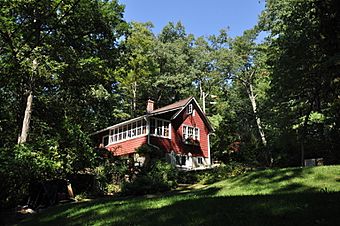Russian Village Historic District facts for kids
Quick facts for kids |
|
|
Russian Village Historic District
|
|
 |
|
| Location | Roughly Kiev Dr. and Russian Village Rd. between US 6 and the Pomperaug River, Southbury, Connecticut |
|---|---|
| Area | 110 acres (45 ha) |
| Built | 1930 |
| Architect | Grebenstchikoff, George; Et al. |
| Architectural style | Late 19th And 20th Century Revivals |
| NRHP reference No. | 88002687 |
| Added to NRHP | December 8, 1988 |
The Russian Village Historic District, also called Churaevka (Russian: Чураевка), is a special summer community. It was started by George Grebenstchikoff and Ilya Tolstoy in Southbury, Connecticut.
This village was created in the 1920s by Russian people who had moved from their home country. It still has unique Russian styles in its houses. There is also a small chapel designed by the famous artist Nicholas Roerich. In 1988, the village was added to the National Register of Historic Places. This means it is an important historical site in the United States.
Contents
A Special Place in History
How the Russian Village Began
The area known as Churaevka or Russian Village in Southbury became popular in the 1920s. Ilya Tolstoy, who was the son of the famous writer Leo Tolstoy, visited the area. He was there to see a translator for one of his books.
Ilya Tolstoy really liked the rolling hills of the area. They reminded him of his home in Russia. So, he bought some land and built a small summer house there. This type of house is called a dacha in Russia, and it is still standing today.
Creating an Artistic Community
Ilya Tolstoy's friend, a writer named George Grebenstchikoff, had an idea. He wanted to create a summer community for artists and writers. Grebenstchikoff bought some of Tolstoy's land and other nearby plots.
He told other Russian people who had moved to America about the area. Soon, many well-known people came to live or visit there. Famous visitors included the musician Sergei Rachmaninoff and the inventor Igor Sikorsky.
What the Village Looks Like
Buildings and Nature
The historic district covers about 110 acres of hilly, wooded land. It slopes down towards the Pomperaug River on one side. On another side, it is near Interstate 84.
There are 46 buildings in the village. They are located on three roads that branch off Russian Village Road. Most of these buildings are small, single-story cottages made of wood. They have a simple style, but they also have special Russian touches. You can see these unique details on things like the entryways and windows.
The St. Sergius Chapel
The most beautiful building in terms of its design is the small St. Sergius Chapel. It was built in 1930. The chapel was designed by the famous artist Nicholas Roerich.
There are also undeveloped areas of land in the village. These were part of the original plan for the community. They give people access to the river, which was used for fun activities and to get water.
 | Lonnie Johnson |
 | Granville Woods |
 | Lewis Howard Latimer |
 | James West |



